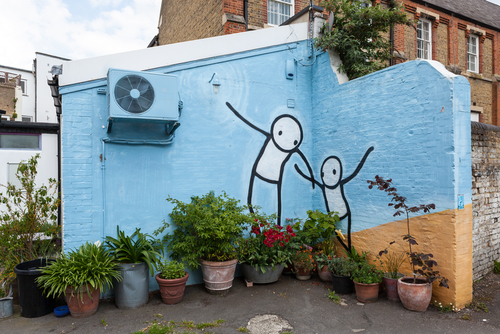
This is a multi-part column. Make sure you read Part 1 or Part 2 might not make lots of sense.
In Part 1, I asked you about your philanthropic autobiography. I asked if, as a donor, you felt listened to and heard. Do you feel respected for your choices as a donor, the aspirations you seek to fulfill?
Part of my philanthropic story
I grew up in an international household. My dad was French. He came to the U.S. as an adult after World War II. His own life story—and his daily experiences living and teaching in the U.S.—taught us kids about being different.
Papa Georges was a university professor. (Go MSU!) After more than 40 years in the U.S., he still had a French accent. Sometimes, he wasn’t clearly understood when he was talking. He ate different foods and had different life experiences, living through a war and living in another country and…
Because he lived with one foot in the U.S. and one foot in France, so did us kids and my American mom. Different foods. Different stories. Regular trips to France and a different language and society and sense of community.
I was raised as an existentialist—and an FDR Democrat. I had an international perspective and saw the Ugly American all too often when we traveled.
My family was against the War in Vietnam before it was popular to be against that war. My dad always asked, “Why do you Americans think you can win? The French were in Indochina for years and never won.”
I’ve always felt different. A lot of people feel that way.
My beliefs. My values.
When I was 31 years old, the local newspaper quoted my dad:
“The most important thing is to step out of your linguistic ghetto and become aware that there are other people in the world who live, eat, learn, and make love in a medium which is not English.”
Over the years, I’ve commandeered that story. Tom and I have translated that into our own slogan, our family battle cry: “People eat, sleep, dream, and make love in languages other than English, in colors other than ours (white), and in pairings other than opposite sex. And that’s glorious! That’s what we’re fighting for.”
And, now I embrace being different.
My life and my work are one and the same.
If I believed in gods or goddesses, I would say that I was put in this world to do the work of philanthropy.
I chose to speak out because I believe that silence is consent. I’m a self-proclaimed change agent. I’m an agitator. I choose to be provocative.
Whether I’m consulting or writing or presenting around the world or volunteering…I speak out. I raise the tough issues. And yes, that makes other people uncomfortable sometimes. But that’s who I work hard to be.
Sign up for our free newsletters
Subscribe to NPQ's newsletters to have our top stories delivered directly to your inbox.
By signing up, you agree to our privacy policy and terms of use, and to receive messages from NPQ and our partners.
Sometimes I’m gracious and kind. Sometimes I push and provoke. Sometimes I go for gentle explaining and careful care. Sometimes I go for shock and awe.
I make fun of myself. I share my mistakes and my embarrassments.
I wear weird hose. I have 65 or more cool but tacky rings—and I mostly always wear one on each hand. (After all, I do have two hands!)
People tell me all this is my brand.
And yes. I chose and choose over and over to be this.
Telling my stories and truly hearing yours
I tell my stories and invite others to tell theirs. I listen to your stories and her stories and his stories and their stories. I find joy in the listening. I work hard to hear the anger and fear and joy and love and anxiety and guilt and confusion and desire and hope and…
Even if I disagree.
Even if I very much dislike his values or her beliefs or their approach to life.
I try so hard to listen and hear and respect and honor him as a human being…her as a fellow person wandering the earth.
Sometimes it’s hard to try because I am so uncomfortable or disagree so very much. But especially when I’m in the nonprofit and philanthropy space…when I’m presenting at a conference or teaching in the Philanthropy and Development Program at Saint Mary’s University of Minnesota…when I’m with donors and prospects and professionals from all over the world…then I work even harder to see them all as philanthropists. To invite and listen to their stories. To really hear. To respect and honor.
And I expect the same, by the way.
I take the risk and I use myself. I tell you my stories and my experiences.
I share my weaknesses and my mistakes and my embarrassments. I use myself as a guinea pig.
I tell you my stories. So you can practice listening and hearing stories. I tell you my stories so you can hear passions that might be similar to yours. More importantly, I tell you my stories so you can hear passions that might be different than yours.
If each of us only listens to similar stories, how do we learn and build community? If each of us only welcomes—yes, welcomes!—stories that match our own beliefs, how can there be community at all? If each of us, as individuals or as groups of individuals, denies the stories of others, how do we build respectful communities?
Here’s another quotation. (I’m an inveterate quote collector. I have little notebooks and typed up pages and computer documents. I’ve been collecting since I was in high school!)
“The world is shaped by two things—stories told and the memories they leave behind.” (Vera Nazarian, Dreams of the Compass Rose)
What are your stories? I want to listen and truly hear. Do you want to hear mine?











